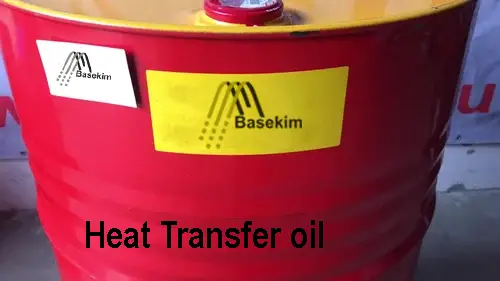- About Us
- Contact Us
- English

Heat Transfer Oil — Premium Thermal Fluid Supplied by Basekim

In every industry, temperature control shapes performance. Whether it is chemicals, food, textiles, or asphalt, heat must be delivered smoothly, safely, and without interruption. Heat transfer oil makes this possible. Unlike water or steam, it resists boiling, corrosion, and pressure problems, ensuring heat flows exactly where it is needed. Therefore, heat transfer oil is not just a fluid — it is an essential part of efficient, safe, and cost-effective production.
At Basekim, we supply premium thermal oils from the UAE and Turkey. Moreover, our products meet global standards for stability, oxidation resistance, and thermal efficiency. As a result, industries worldwide trust Basekim to keep their systems running smoothly.
What Is Heat Transfer Oil?
Heat transfer oil is a highly refined mineral or synthetic fluid engineered to carry heat in closed-loop systems. Its design makes it different from standard lubricants or coolants. Because it resists thermal cracking, oxidation, and vaporization, it performs reliably across a wide temperature range.
When systems demand constant heat without fluctuations, this oil delivers. Consequently, operators benefit from stable production, fewer breakdowns, and longer service life of equipment. In addition, heat transfer lubricants protect metal surfaces, resist deposit build-up, and lower overall maintenance needs.
Why Heat Transfer Oil Is Important
Because heating is central to so many processes, heat transfer oil provides multiple advantages:
-
Wide temperature performance: It works from moderate to extreme heat; therefore, plants enjoy flexible use across many applications.
-
Low vapor pressure: It does not create high-pressure risks; consequently, it improves workplace safety.
-
Oxidation resistance: It slows oil degradation; moreover, downtime and replacement costs reduce.
-
Thermal stability: It avoids sludge formation; as a result, systems remain clean and efficient.
-
Energy efficiency: It transfers heat with minimal loss; in addition, industries save fuel and energy costs.
Industrial Applications of Heat Transfer Oil
Because many industries depend on precise heating, heat transfer oil is widely applied across:
-
Chemical and petrochemical plants — for reactors, distillation, dryers, and heat exchangers.
-
Textile industry — for stenters, printing, and drying systems where stable heat is vital.
-
Food and beverage industry — for frying, baking, processing, and heating systems; therefore, it ensures safe, clean heating.
-
Plastics and rubber plants — for injection molding, extrusion, and press heating; consequently, product quality improves.
-
Asphalt and bitumen plants — for storage tanks, melting systems, and mixing units; moreover, heat transfer oil keeps materials workable.
-
Paper and wood industries — for dryers, laminators, and veneer presses.
In short, wherever controlled heating matters, heat transfer oil becomes a critical part of the system.
Benefits at a Glance
| Feature | Advantage for Industry |
|---|---|
| Wide temperature range | Therefore, one oil fits multiple heating systems |
| Oxidation resistance | Consequently, oil lasts longer and cuts costs |
| Low vapor pressure | Moreover, systems stay safe and stable |
| Thermal efficiency | As a result, energy use decreases |
| Long service life | In addition, maintenance intervals extend |
Types of Heat Transfer Oil
Because no two operations are the same, industries use different oil types:
-
Mineral heat transfer oils — affordable, reliable, widely used.
-
Synthetic heat transfer lubricants— higher resistance to extreme heat, excellent oxidation control.
-
Food-grade thermal fluids — non-toxic, designed for safe use in food and beverage applications.
-
Biodegradable oils — sustainable solutions for eco-conscious industries.
Therefore, choosing the right grade depends on operating temperature, safety requirements, and industry standards.
Packaging & Supply by Basekim
Basekim supplies heat transfer lubricants in packaging designed for both small users and large industrial operations:
-
20L cans — convenient for small machines and testing.
-
200L steel drums — ideal for factories, plants, and regular use.
-
IBC tanks and flexitanks — for bulk operations in large projects.
Because we operate supply hubs in the UAE and Turkey, lead times are short. Moreover, our export packaging ensures oils arrive clean, safe, and ready for immediate use. Consequently, global buyers trust Basekim to deliver on time, every time.
Compliance and Documentation
Heat transfer oils must meet strict requirements to perform safely. That is why every Basekim shipment includes:
-
COA (Certificate of Analysis): Proving quality and consistency.
-
Technical Data Sheets: Detailing viscosity, flash point, pour point, and thermal stability.
-
MSDS (Material Safety Data Sheets): For safe handling and storage.
Therefore, customers receive complete assurance that the oils they buy are tested, approved, and compliant.
Closing
Heat transfer oil is the silent enabler of industrial performance. It keeps processes stable, safe, and efficient by moving heat exactly where it is needed. Because Basekim supplies premium heat transfer oils from the UAE and Turkey, industries worldwide trust us to keep their plants running.
Moreover, our flexible packaging, fast logistics, and certified quality ensure buyers receive more than a product — they receive reliability. Consequently, choosing Basekim heat transfer lubricants is the smart way to secure safe heating, lower costs, and long-term performance.
Q1:What makes heat transfer oil safer than steam?
It avoids high pressure, corrosion, and scaling problems. Therefore, it provides safer and more stable heat transfer.
Q2:How long does heat transfer oil last in a system?
It depends on temperature and maintenance. Moreover, oxidation-resistant grades last several years with regular monitoring.
Q3:Which industries benefit most from heat transfer oils?
Food, chemical, textile, plastics, asphalt, and many others. Consequently, it is one of the most versatile fluids in modern industry.
Contact Info
Turkey office:No.6 of Fahrettin Pasa Sokak , Galip Erdem steet, Ilkbahar Mah. Turan Gunes Ave. Çankaya Ankara
Phone:00903125147055
Dubai office: 3509 of the Burligton tower, business bay, Dubai-UAE
Phone:0097142369830